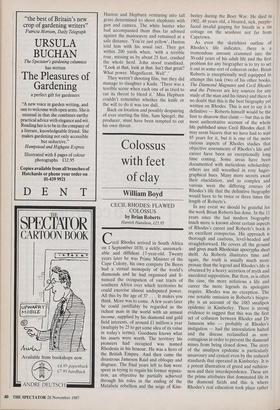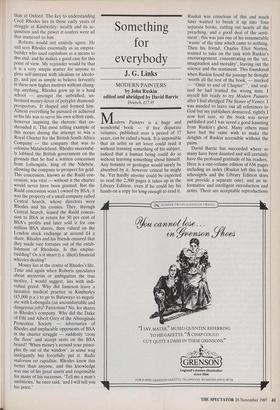Colossus with feet of clay
William Boyd
CECIL RHODES: FLAWED COLOSSUS by Brian Roberts Hamish Hamilton, £15.95 Cecil Rhodes arrived in South Africa on 1 September 1870, a sickly, unremark- able and diffident 17-year-old. Twenty years later he was Prime Minister of the Cape Colony, his own company De Beers had a virtual monopoly of the world's diamonds and he had organised and fi- nanced the occupation of vast tracts of southern Africa over which territories he could exercise almost undisputed power. All this by the age of 37 . . . It makes you think. More was to come. A few years later he could justifiably be regarded as the richest man in the world with an annual income, supplied by his diamond and gold field interests, of around £1 million a year (multiply by 25 to get some idea of its value in today's terms). Goodness knows what his assets were worth. The territory his pioneers had occupied was named Rhodesia in his honour. He was a hero of the British Empire. And then came the disastrous Jameson Raid and obloquy and disgrace. The final years left to him were spent in trying to regain his former reputa- tion, an objective he partially achieved through his roles in the ending of the Matabele rebellion and the seige of Kim- berley during the Boer War. He died in 1902, 48 years old, a bloated, sick, purple- faced invalid gasping for breath in a tin cottage on the seashore not far from Capetown.
As even the sketchiest outline of Rhodes's life indicates, there is a tremendous amount crammed into the 30-odd years of his adult life and the first problem for any biographer is to try to set it out in some sort of coherent order. Brian Roberts is exceptionally well equipped to attempt this task (two of his other books, The Diamond Magnates and Cecil Rhodes and the Princess are key sources for any study of the man and his times) and there is no doubt that this is the best biography yet written on Rhodes. This is not to say it is definitive — Roberts himself would be the first to disavow that claim — but this is the most authoritative account of the whole life published since Cecil Rhodes died. It may seem bizarre that we have had to wait 85 years for it, but it is one of the more curious aspects of Rhodes studies that objective assessments of Rhodes's life and career have been an exceptionally long time coming. Some areas have been documented with meticulous scholarship; others are still wreathed in rosy hagio- graphical hues. Many more secrets await their elucidation, and so complex and various were the differing courses of Rhodes's life that the definitive biography would have to be twice or three times the length of Roberts's.
In any event we should be grateful for the work Brian Roberts has done. In the 11 years since the last modem biography much more is known about certain aspects of Rhodes's career and Roberts's book is an excellent conspectus. His approach is thorough and cautious, level-headed and straightforward. He covers all the ground and gives much Rhodesian apocrypha short shrift. As Roberts illustrates time and again, the truth is usually much more prosaic than the legend and Rhodes's life is obscured by a heavy accretion of myth and anecdotal supposition. But then, as is often the case, the more nefarious a life and career the more legends its apologists require. Rhodes was no exception. The one notable omission in Roberts's biogra- phy is an account of the 1883 smallpox epidemic in Kimberley. There is strong evidence to suggest that this was the first act of collusion between Rhodes and Dr Jameson who — probably at Rhodes's instigation — had the innoculation halted and the disease reclassified as non- contagious in order to prevent the diamond mines from being closed down. The story of the smallpox epidemic is particularly unsavoury and cynical even by the reduced standards that operated in Kimberley. It is a potent illustration of greed and ruthless- ness and their interdependence. These are the prime attributes that dominated life in the diamond fields and this is where Rhodes's real education took place rather than at Oxford. The key to understanding Cecil Rhodes lies in those early years of struggle at Kimberley: wealth and its ac- quisition and the power it confers were all that mattered to him.
Roberts would not entirely agree. He still sees Rhodes essentially as an empire- builder who used capitalism as a means to this end, and he makes a good case for this point of view. My rejoinder would be that it is a very simple matter for anyone to gloss self-interest with idealism or ideolo- gy, and just as simple to believe fervently in these new higher motives without chang- ing anything. Rhodes grew up in a haril school — amongst the unbridled, un- licensed money-fever of polyglot diamond- prospectors. It shaped and formed him. Almost everything he pursued or achieved in his life was to serve his own selfish ends, however inspiring the rhetoric that en- shrouded it. The most telling example of this occurs during the attempt to win a Royal Charter for the British South Africa Company — the company that was to colonise Matabeleland. Rhodes successful- ly lobbied the British government on the grounds that he had a written concession from Lobengula, king of the Ndebele, allowing the company to prospect for gold. This concession, known as the Rudd con- cession, was vital — without it the charter would never have been granted. But the Rudd concession wasn't owned by BSA; it was the property of a small company called Central Search, whose directors were Rhodes and his cronies. They, through Central Search, leased the Rudd conces- sion to BSA in return for 50 per cent of BSA's profits and later sold it for one million BSA shares, then valued on the London stock exchange at around £4 a share. Rhodes and his friends ensured that they made vast fortunes out of the estab- lishment of Rhodesia. Is this empire- building? Or is it smart (i.e. illicit) financial wheeler-dealing?
Money lies at the centre of Rhodes's life. Time and again when Roberts speculates about mysteries or ambiguities the true motive, I would suggest, lies with indi- vidual greed. Why did Jameson leave a lucrative medical practice in Kimberley (£5,000 p.a.) to go to Bulawayo to negoti- ate with Lobengula (an uncomfortable and dangerous job)? Patriotism? No, for shares in Rhodes's company. Why did the Duke of Fife and Albert Grey of the Aboriginals Protection Society — adversaries of Rhodes and implacable opponents of BSA in the charter struggle — suddenly 'cross the floor' and accept seats on the BSA board? 'When money's around your princi- ples fly out of the window', as some wag inelegantly but forcefully put it. Radix malorum est cupiditas. Rhodes knew this better than anyone, and this knowledge was one of his great assets and responsible for many of his successes. 'Tell me a man's ambitions,' he once said, 'and I will tell you his price.'



































































 Previous page
Previous page